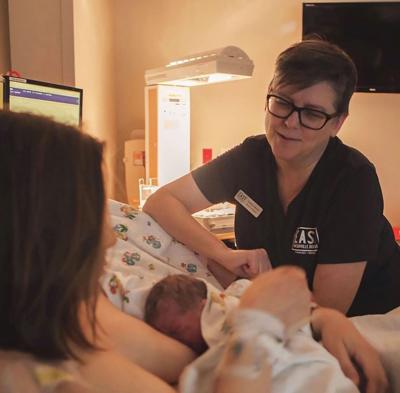Even for those who have done it before, childbirth can be full of surprises. Doulas provide nonclinical emotional, physical and informational support while serving as advocates for the pregnant person.
“We are explainers of the medical jargon, and we are advocators for what you want in that space,” says Andrea Hewitt, founder of East Nashville Doulas. “I think there’s just such a mystery around birth. There’s so much misinformation out there, and people don’t really understand what’s normal. I think that is something that doulas bring to the table.”
Studies show that having doulas in the room contributes to better birth outcomes, and can combat maternal mortality. The state’s latest maternal mortality report found that between 2017 and 2020, 113 Tennessee women died during pregnancy or within a year of their delivery because of pregnancy-related causes. Most of those deaths (89 percent) were deemed preventable. Non-Hispanic Black women were 2.5 times more likely to die than white women.
State Sen. London Lamar (D-Memphis) introduced two related bills involving doulas this year. One bill, which would have mandated TennCare to cover doula services, got some bipartisan support but was ultimately shut down by the state-sponsored insurance. Another bill still making its way through the legislature (SB0394) would create an advisory committee to study existing doula certification programs and sort out reimbursement rates for the profession if it were to be implemented in TennCare coverage.
“I think that in the new state of birthing that we have here in Tennessee, with abortion being banned and women are forced to have kids — I really think this should be a priority to offer services that have been proven to reduce the rate of infant and maternal mortality in the United States,” Lamar tells the Scene. “More women are going to have babies. The ones who will be most impacted are poor women who can’t, if they wanted to, go out of state to access an abortion.”
Adding TennCare coverage for doulas would create a path for these professionals to serve the most vulnerable as well as get paid for their services. But there’s trepidation in the community around certification. Some doulas fear that if state certification becomes more regulated, people with lived experience rather than conventional training could be left out. Kristin Mejia is a doula and founder of Homeland Heart, an organization that focuses on Black maternal health. She would like to see doula legitimacy based less on a certification from an organization, and more on being able to verify the person’s knowledge.
“The art of doulaing is one that is a traditional art that’s been mastered through generations and passed down, as we see in Indigenous cultures and African American culture,” Mejia says. “It is very hard to be able to put a mark on what makes someone adequate enough to do the work. However, there’s a standard knowledge base that comes along with being a doula.”
In 2022, the Metro Public Health Department introduced doula services for the first time in its Strong Babies program, which serves seven ZIP codes deemed most at risk of infant mortality in the Nashville area. The program measures success in a decreased number of cesarean sections, and therefore a decreased likelihood of post-op complications. High breastfeeding rates, low epidural rates, and high participation in post-partum visits are also measures of success.
In the first 10 months of the program, 63 percent of doula-supported families did not use epidurals, 100 percent initiated breastfeeding, and 63 percent of doula-supported families completed their post-partum visits.
To work at Metro, a person has to be trained, but there’s room for flexibility when it comes to where certification is attained. That’s according to Dawn Smith, a doula and and doula-support coordinator for Metro Nashville Public Health.
“I think experience outweighs being able to certify or take an exam,” Smith says. “What is your experience and what are your outcomes? That speaks more to me.”
Mejia notices plenty of interest in the profession and demand for services, but the doula workforce suffers from low pay and high turnover. Homeland Hearts has a sliding scale of $125 to $2,000, and East Nashville Doulas charges between $1,300 and $2,000, depending on experience. Services are almost never covered by insurance. Metro offers services for free, and Ascension Saint Thomas and Vanderbilt University Medical Center have volunteer doula programs.
“How do we provide enough doulas that are cost-effective for people to have, and where doulas get paid?” Hewitt asks. “Because if they do too many births where they don’t get paid, they’re gonna get burned out, because who is going to pay their bills? That’s kind of where we are right now, is trying to figure that out. And I don’t think anyone has figured that out yet. In my mind, we have enough doulas when everyone who wants a doula has one.”
As the statistics show, the situation is especially dire for Black mothers — who historically are under-informed by doctors when it comes to their deliveries, Mejia says. She says a notion in the Black birthing world is that doctors are to Black women what police are to Black men.
“Unfortunately, for Black women, there is a need for there to be some additional supervision in the room, which is unfair,” she says. “But until we can work through that, it’s important, it’s vital that there’s another set of experienced eyes in the room.
“It’s been going on for years that we’ve been working through this doula reimbursement bill,” Mejia continues. “In that amount of time, women are dying. While I have a lot of hope for the progression for this bill and the advancement of the doula reimbursement project, I think we need to go ahead and put our track shoes on and start sprinting toward the finish line.”





